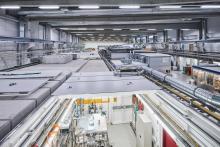As part of a strategic cooperation on materials research, scientists at TU Bergakademie Freiberg will in future have extended access to the X-ray light sources of the Deutsches Elektronen-Synchrotron DESY. For 2023 and 2024, a total of 1900 hours are planned for experiments and measurements at DESY's X-ray source PETRA III. The research topics covered include issues of material synthesis and material behaviour under extreme conditions, the generation of 3D-printed components, the development of electronic and battery materials, as well as the development of innovative shape memory materials and climate-neutral material conversion processes.

With the PETRA III accelerator ring, DESY operates one of the most powerful X-ray radiation sources in the world today. It allows material investigations that are not possible by any other means. Processes can be observed at the atomic and subatomic level that have so far only been modelled theoretically. Such insights into the nature of materials expand the understanding of physical effects and interrelationships. The resulting knowledge is used to develop materials with better or novel functions that form the basis for innovative technologies.
Other universities also benefit - start-up funding from the Free State of Saxony
Researchers from other Saxon universities and research institutions are involved in the research activities and can also benefit from the opportunities created. "Our goal is to extend the strategic cooperation with DESY to all Saxon universities as soon as possible," explains the Rector of TU Bergakademie Freiberg, Prof. Klaus-Dieter Barbknecht. "This should strengthen materials research and technology development in Saxony as a whole," adds Dr. Matthias Zschornak from TU Bergakademie Freiberg. Together with Prof. David Rafaja, he coordinates the initiative. "The findings we obtain from the experiments at DESY are, on the one hand, scientifically very interesting, but at the same time they can also provide important contributions to the development of applications, especially those that will help us advance in the implementation of the energy transition, the reduction of climate-damaging emissions and the sustainable use of resources," adds Prof. David Rafaja.
"With their outstanding competence in the field of materials research and the direct linking of basic research and industry-oriented technology development, the Saxon universities and especially the TU Bergakademie Freiberg are attractive partners for DESY, with whom we would like to work even more closely and in joint initiatives," says DESY Director Prof. Helmut Dosch, explaining the cooperation. Within the framework of the cooperation, both partners aim to consolidate their leading international position in the research areas they are working on and to acquire joint research projects. Both institutions are contributing a large amount of their own funds and resources to the cooperation, supplemented by start-up financing from the Free State of Saxony.